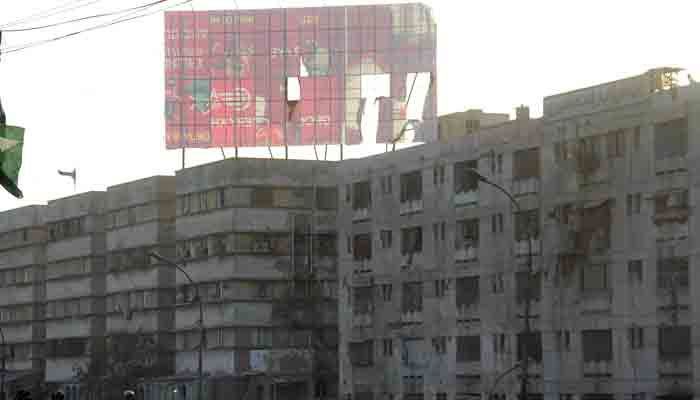Illegal hoardings in Rawalpindi remain unchecked
Civic authorities must take necessary action against those putting up illegal hoardings. Rawalpindi has a vibrant social life; however, the city faces a significant issue with the rampant proliferation of unauthorized advertising hoardings.
“These banners are erected without permission from civic authorities. Despite existing regulations and penalties, this problem persists, leading to accidents. This situation underscores the urgent need for stringent enforcement and increased public awareness,” says Altaf Abbas. “These banners are used for various purposes, including political campaigns, advertisements, religious events, and personal celebrations. However, these banners pose significant risks to public safety and environmental health,” says Ejaz Haider. “These banners are often erected without proper structural support, making them susceptible to collapsing or being blown away by strong winds. When they fall, they can cause severe injuries or even fatalities to innocent pedestrians and motorists,” says Mahboob Ali.
“There have been a few tragic accidents in the city caused by illegal hoardings. Most of these details are available on the media. While many such incidents go unreported, says Basharat Hasan.
“The unchecked proliferation of illegal hoardings mars the aesthetic appeal of the city. Historical landmarks, heritage buildings, and public spaces are often obscured by these advertisements, detracting from the city’s charm. This visual pollution not only affects residents’ quality of life but also hampers tourism, as visitors find the cluttered cityscape unappealing,” says Ikram Hussain.
“Despite directions not to erect illegal hoardings that could inconvenience motorists and other commuters and pledge by advertisers to comply with the laws regarding the placement of banners, these banners keep coming up,” says Abdal Shabbir.
“Corruption and bribery, political pressure, resource constraints of the civic authorities and lack of government’s will to tackle the menace are the key reasons,” adds Abdal. “Awareness campaigns must be conducted to educate the public about the dangers of the unauthorized banners and the legal implications involved. This can be done via social media, local newspapers, and public service announcements,” says Ashfaq Ali.
“Involving the community is crucial to combat this menace. Residents can form neighborhood watch groups to monitor and report unauthorized banners. Additionally, community leaders and influencers can play a significant role in advocating for a banner-free city,” says Abid Abbas.
-
 Jennifer Aniston Already Decided Her Wedding Dress?
Jennifer Aniston Already Decided Her Wedding Dress? -
 Prince Harry, Meghan’s Hollywood Party Drama Exposes Chaotic PR Strategy
Prince Harry, Meghan’s Hollywood Party Drama Exposes Chaotic PR Strategy -
 Jennifer Garner Reacts To Savannah Guthrie's Video As Search For Nancy Guthrie Continues
Jennifer Garner Reacts To Savannah Guthrie's Video As Search For Nancy Guthrie Continues -
 Bad Bunny Leaves Fans Worried With Major Move After Super Bowl Halftime Show
Bad Bunny Leaves Fans Worried With Major Move After Super Bowl Halftime Show -
 Captain Jason Talks Personal Hardships He Faced Ahead Of 'Below Deck' Season 4
Captain Jason Talks Personal Hardships He Faced Ahead Of 'Below Deck' Season 4 -
 Anti-monarchy Group Reacts To Prince William, Kate Middleton Statement On Epstein Scandal
Anti-monarchy Group Reacts To Prince William, Kate Middleton Statement On Epstein Scandal -
 Andrew 'must' Apologize Not Wider Royal Family For Jeffrey Epstein Links
Andrew 'must' Apologize Not Wider Royal Family For Jeffrey Epstein Links -
 Super Bowl 2026: Why Didn't Epstein Survivors Ad Air On TV?
Super Bowl 2026: Why Didn't Epstein Survivors Ad Air On TV? -
 'Harry Potter' TV Series Exec Teases 'biggest Event In Streaming': Deets
'Harry Potter' TV Series Exec Teases 'biggest Event In Streaming': Deets -
 Camila Mendes Finally Reveals Wedding Plans With Fiancé Rudy Mancuso
Camila Mendes Finally Reveals Wedding Plans With Fiancé Rudy Mancuso -
 Beatrice, Eugenie Blindsided By Extent Of Sarah Ferguson’s Epstein Links
Beatrice, Eugenie Blindsided By Extent Of Sarah Ferguson’s Epstein Links -
 Girl And Grandfather Attacked In Knife Assault Outside Los Angeles Home
Girl And Grandfather Attacked In Knife Assault Outside Los Angeles Home -
 Super Bowl Halftime Show 2026: What Did Trump Say About Bad Bunny?
Super Bowl Halftime Show 2026: What Did Trump Say About Bad Bunny? -
 Piers Morgan Defends Bad Bunny's Super Bowl Performance, Disagrees With Trump Remarks
Piers Morgan Defends Bad Bunny's Super Bowl Performance, Disagrees With Trump Remarks -
 Andrew Lands In New Trouble Days After Royal Lodge Eviction
Andrew Lands In New Trouble Days After Royal Lodge Eviction -
 Instagram, YouTube Addiction Case Trial Kicks Off In California
Instagram, YouTube Addiction Case Trial Kicks Off In California




